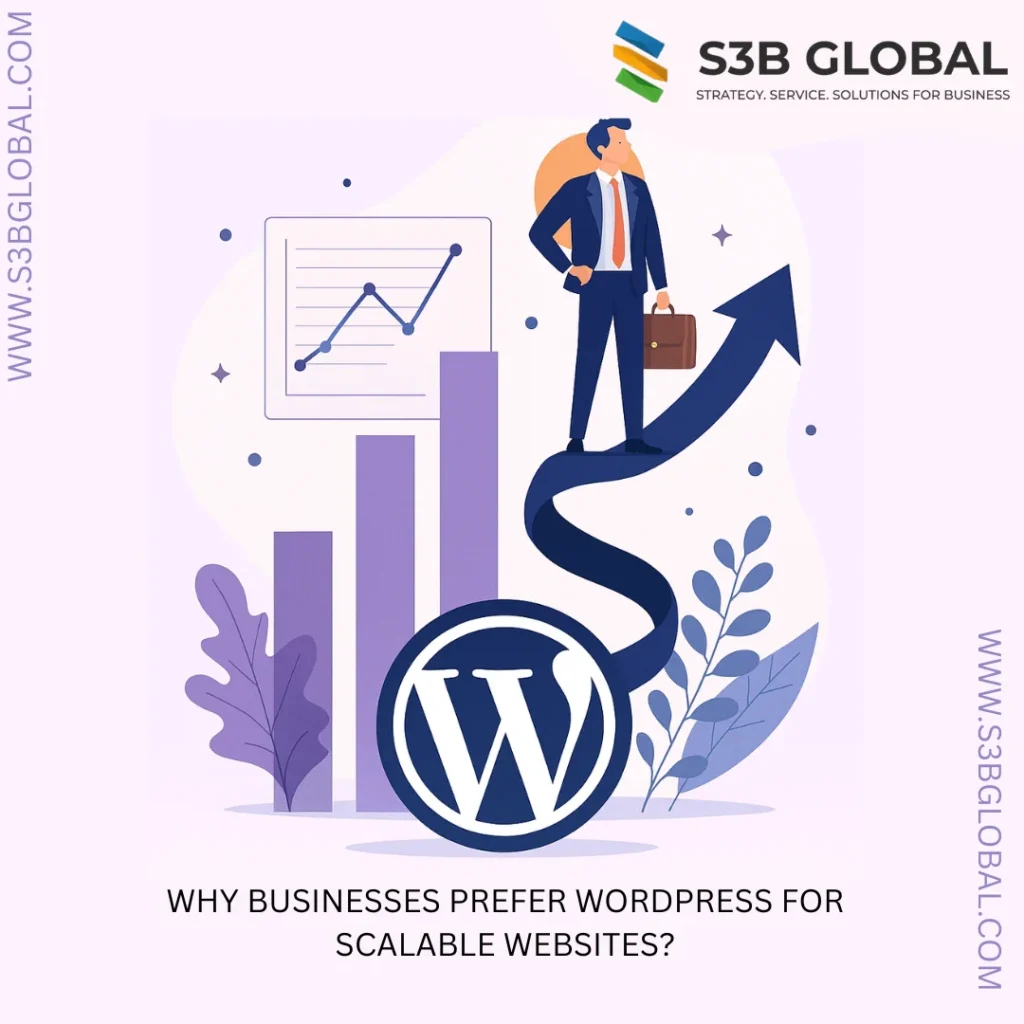
WordPress powers a huge slice of the web, and for good reason: it’s flexible, widely supported, and easy to scale from a simple brochure site to a global, high-traffic platform. For businesses that want predictable growth, rapid iteration, and lower long-term build costs, WordPress ticks many boxes.
1. Proven market adoption and ecosystem
Adoption matters. A large market share means better third-party support (plugins, themes, agencies), more developer talent, and a mature security/maintenance ecosystem – all essential for scaling. WordPress’s widespread use also translates to a huge library of extensions and prebuilt solutions you can plug into your growth plan.
Why this helps you: hiring, integrations, and troubleshooting are faster and cheaper when you rely on a platform with broad industry support.
2. Architecture that scales: plugins, APIs, and headless options
WordPress started as a monolithic CMS, but modern WordPress includes robust APIs (REST API) and supports decoupled/headless architectures. That means you can:
-
Use WordPress purely as a content backend and serve content to web apps, mobile apps, or static frontends.
-
Improve front-end performance by using modern frameworks (React, Vue, Next.js) while keeping content management in WordPress.
Why this helps you: decoupling lets teams scale front-end performance independently (CDNs, edge caching) while keeping editorial workflows consistent.
3. Multisite and multisite-like patterns for enterprise management
WordPress Multisite and enterprise-grade solutions let organizations run many sites from one control plane consistent updates, centralized user/permission management, and shared plugins/themes. This lowers maintenance overhead for brands with regional sites, product microsites, or franchise networks.
Why this helps you: central governance with flexibility for local teams ideal for scaling brand presence across regions.
4. Managed hosting and platform services that remove scaling pain
True scalability for WordPress often comes from the hosting layer: managed WordPress hosts (WP Engine, Kinsta, others) offer caching, auto-scaling, staging environments, global CDN integration, and expert support – letting teams handle traffic spikes without rearchitecting everything. These platform features remove operational complexity from your team.
Why this helps you: predictable performance under load and fewer surprises during growth periods.
5. Vast plugin ecosystem
From eCommerce (WooCommerce) to multilingual support, headless connectors, and enterprise search, WordPress plugins let you add capabilities quickly. That lowers development time for new business initiatives – crucial when you’re experimenting or rolling out new services. (Caveat: pick high-quality, maintained plugins to avoid technical debt.)
Why this helps you: launch faster, iterate often, and scale feature sets without rebuilding core systems.
6. SEO and content-first advantages
WordPress was built for content. Its editing UX, URL control, metadata options, and widespread SEO tooling (plugins like Yoast, Rank Math, schema generators) make it straightforward to implement SEO best practices at scale. Combine that with server-side best practices (structured data, fast hosting, CDN) and you have a growth-friendly platform for organic visibility.
Why this helps you: better organic acquisition as you scale content output across categories, languages, and campaigns.
7. Security and maintainability at scale (with the right approach)
Out of the box, WordPress requires attention to updates, plugin hygiene, and hardening. But when paired with managed hosting, automated backups, staging workflows, and security best practices, it’s a secure platform for large sites. Enterprises often use dedicated WordPress engineering teams or partners to implement policy and scanning workflows.
Why this helps you: predictable maintenance, fewer outages, and controlled upgrade paths.
Practical checklist: How S3B Global should build a scalable WordPress site
-
Choose managed WordPress hosting (support for auto-scaling, global CDN, daily backups).
-
Decide architecture early: monolithic vs headless – pick headless if you’ll deliver content to multiple channels.
-
Standardize plugins and themes: limit the active plugin set and choose well-maintained, high-reputation vendors.
-
Implement CI/CD + staging: version control, automated deployments, and QA on staging before production.
-
Use a multisite or centralized management for multi-region or multi-brand deployments.
-
Optimize for performance: image optimization, critical CSS, server-side caching, and an edge CDN.
-
Security & compliance: WAF, HTTPS everywhere, least-privilege user roles, regular vulnerability scans.
-
Monitoring & observability: uptime monitoring, analytics, and load testing before big launches.
Real-world signals
-
WordPress continues to dominate the web by market share, which signals mature tooling and community support – a major factor enterprises consider when choosing a platform.
-
Leading managed hosts and the enterprise WordPress ecosystem (VIP, WP Engine, Kinsta) provide the tools necessary to scale reliably.
Conclusion & CTA
WordPress is more than a blogging platform: with headless capabilities, enterprise tooling, multisite management, and a massive ecosystem, it’s a pragmatic choice for businesses that plan to scale. If you want S3B Global to design a growth-ready WordPress architecture (monolithic or headless), audit your plugin stack, and set up managed hosting + CI/CD, we can draft a customized plan and cost estimate.
Call to action: Reply “Scale my WordPress” and I’ll create a tailored 30-60-90 day implementation plan for S3B Global (architecture, hosting recommendation, plugin audit, and performance baseline).
Sources (for reference & further reading)
-
WordPress official blog — WordPress Market Share, Statistics, and More (Apr 2025). WordPress.com
-
WordPress VIP — Headless WordPress / REST API benefits for enterprise. WordPress VIP+1
-
Human Made — Headless WordPress & REST API guidance. Human Made
-
Elementor — Best Managed WordPress Hosting in 2025 (overview of WP Engine, Kinsta, etc.). Elementor
-
TechRadar — WP Engine review and managed hosting analysis. TechRadar
